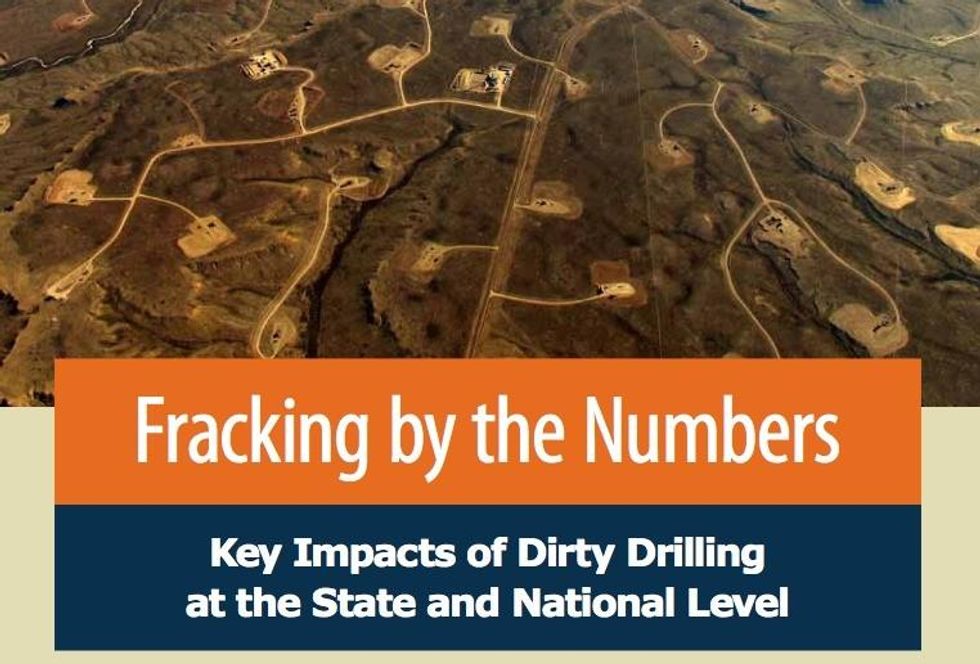The explosion of hydraulic fracturing in the last several years, according to a new report, is creating a previously 'unimaginable' situation in which hundreds of billions of gallons of the nation's fresh water supply are being annually transformed into unusable--sometimes radioactive--cancer-causing wastewater.
According to the report, Fracking by the Numbers, produced by Environment America, the scale and severity of fracking's myriad impacts betray all claims that natural gas is a "cleaner" or somehow less damaging alternative to other fossil fuels.
The report explores various ways in which gas fracking negatively impacts both human health and the environment, including the contamination of drinking water, overuse of scarce water sources, the effect of air pollution on public health, its connection to global warming, and the overall cost imposed on communities where fracking operations are located.
"The bottom line is this: The numbers on fracking add up to an environmental nightmare," said John Rumpler, the report's lead author and senior attorney for Environment America. "For our environment and for public health, we need to put a stop to fracking."
In fact, the report concludes that in state's where the practice is now occurring, immediate moratoriums should be enacted and in states where the practice has yet to be approved, bans should be legislated to prevent this kind of drilling from ever occurring.
Though the report acknowledges its too early to know the full the extent of the damage caused by the controversial drilling practice, it found that even a look at the "limited data" available--taken mostly from industry reports and government figures between 2005 and 2012--paints "an increasingly clear picture of the damage that fracking has done to our environment and health."
So what are the numbers?
The report measured key indicators of fracking threats across the country, and found:
* 280 billion gallons of toxic wastewater generated in 2012,
* 450,000 tons of air pollution produced in one year,
* 250 billion gallons of fresh water used since 2005,
* 360,000 acres of land degraded since 2005,
* 100 million metric tons of global warming pollution since 2005.
"The numbers don't lie," said Rumbpler. "Fracking has taken a dirty and destructive toll on our environment. If this dirty drilling continues unchecked, these numbers will only get worse."
The Environment America report comes on the heels of a study released by researchers at Duke University earlier this week that found a "surprising magnitude of radioactivity" in the local water near a fracking operation in Pennsylvania.
And ClimateProgress adds:
The report also pointed out the weaknesses of current wastewater disposal practices -- wastewater is often stored in deep wells, but over time these wells can fail, leading to the potential for ground and surface water contamination. In New Mexico alone, chemicals from oil and gas pits have contaminated water sources at least 421 times, according to the report.
Those toxic chemicals are exempt from federal disclosure laws, so it's up to each state to decide if and how the oil and gas companies should disclose the chemicals they use in their operations -- which is why in many states, citizens don't know what goes into the brew that fracking operators use to extract oil and natural gas. Luckily, some states are beginning to address this -- California recently passed a law ordering fracking companies to make their chemicals public, an order similar to laws in about seven other states.
The report also noted the vast quantities of water needed for fracking -- from 2 million to 9 million gallons on average to frack one well. Since 2005, according to the report, fracking operations have used 250 billion gallons of freshwater. This is putting a strain on places like one South Texas county, where fracking was nearly one quarter of total water use in 2011 -- and dry conditions could push that amount closer to one-third.
In addition to the impact on surface and ground water supplies, fracking is a well-known contributor to global warming and numerous studies have shown that the methane emissions created by the extraction and transportation of natural gas far outweighs any benefit generated by its ability to burn "cleaner" than oil or coal.
Download or read the complete report here (pdf).
_______________________________________




